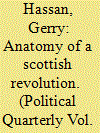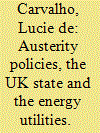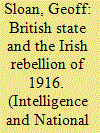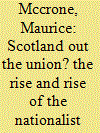| Srl | Item |
| 1 |
ID:
107203


|
|
|
|
|
| Publication |
2011.
|
| Summary/Abstract |
Scottish politics isn't about some remote northern politics but go to the heart of the nature, character and power dimensions of the UK and British state. Scotland has been dramatically changed by the scale of the SNP landslide victory in the 2011 Scottish Parliament elections. Scottish society, identity and culture along with the politics of unionism and nationalism have all changed and will change further. The old fashioned politics of devolution are dead, but what comes next and what are the consequences for Scottish independence? What has to be challenged are old-fashioned out-of-date views of the SNP, and the unreconstructed nationalism of the British state.
|
|
|
|
|
|
|
|
|
|
|
|
|
|
|
|
| 2 |
ID:
155414


|
|
|
|
|
| Summary/Abstract |
In 2008, the economic downturn coincided with a major shift in the energy sector paradigm. This state of emergency forced the UK government to try to steer the objectives of its major energy players. This crisis put the UK state's capacity to influence its mostly privately-owned energy sector to the test. Using the example of energy utilities, this article aims to explore whether the austerity agenda impacted the relationship between the UK state and its public services. The purpose is to determine whether current multiple crises have forced the UK state to adopt an exceptionally interventionist approach that doesn't tally with the austerity agenda, or whether these crises merely revealed dynamics which had been underlying in the management of its energy utilities since the beginning of the neo-liberal era.
|
|
|
|
|
|
|
|
|
|
|
|
|
|
|
|
| 3 |
ID:
123176


|
|
|
|
|
| Publication |
2013.
|
| Summary/Abstract |
The teleological narrative that has dominated the handling of intelligence by the British state in the events that led up to the 1916 Irish Rebellion in Dublin has been characterised as a cocktail of incompetence and mendacity. Using new and existing archive material this article argues that both the cabinet in London and key members of the Irish Executive in Dublin were supplied with accurate and timely intelligence by the Admiralty's signals intelligence unit, the Royal Irish Constabulary and the Dublin Metropolitan Police with respect to this event. Far from being a failure of intelligence here is evidence to show that there occurred a failure of response on behalf of key decision-makers. The warnings that were given by intelligence organisations were filtered through the existing policy preferences and assumptions. As a result of these factors accurate evaluations and sound judgement were not exercised by key officials, such as Sir Matthew Nathan, in Dublin Castle.
|
|
|
|
|
|
|
|
|
|
|
|
|
|
|
|
| 4 |
ID:
111658


|
|
|
|
|
| Publication |
2012.
|
| Summary/Abstract |
The election of the Scottish National party as a majority government in 2011 is as challenging to the British state as it was unexpected. While explanations for SNP success focused on Labour's faulty campaign and poor leadership, the last half-century has seen the rise and rise of the nationalist agenda in Scotland. Scotland's politics are now more different from England's than at any time since the 1950s. The Scottish parliament is the effect of that change rather than its cause, while party competition between Labour and the SNP north of the border has shifted political gravity centre-left in contrast with England. It is not inevitable, however, that Scots would vote for Independence in a referendum. Nevertheless, Scotland is a more semi-detached country than at any point in the history of the Union, and the future of the British state, at least in its present form, cannot be taken for granted.
|
|
|
|
|
|
|
|
|
|
|
|
|
|
|
|